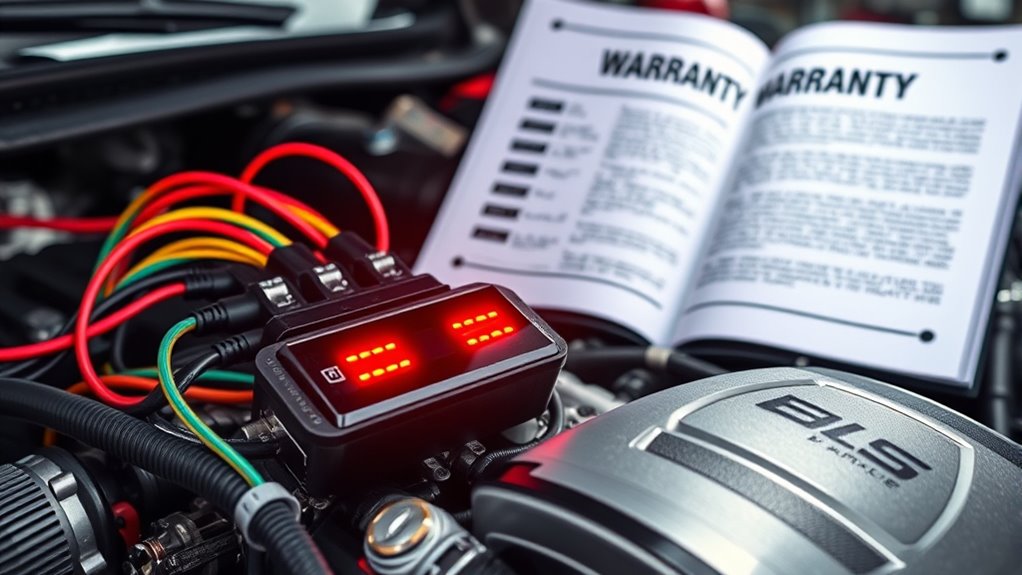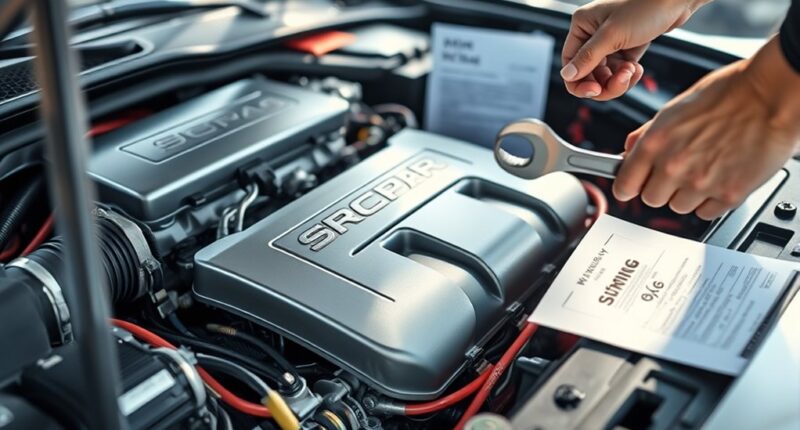If you modify your vehicle through tuning, it can complicate warranty coverage, but the Magnuson-Moss Act requires manufacturers to clearly state what’s covered and what isn’t. They can’t simply void your warranty due to modifications unless they prove those changes caused the issue. Understanding your rights under this law helps you avoid unnecessary denial of coverage. To find out exactly how your modifications might affect your warranty, discover the important details below.
Key Takeaways
- Under Magnuson-Moss, warranties must clearly specify if modifications like tuning void coverage.
- Many manufacturers claim tuning voids warranty, but this can be misleading under federal law.
- Manufacturers cannot deny warranty coverage solely because a vehicle was modified unless they prove the modification caused the issue.
- Keeping records of modifications and consulting warranty terms helps protect your rights.
- The law emphasizes transparency; unjust denial due to tuning may be challenged legally.

Have you ever wondered what sets a warranty apart from a Magnuson-Moss warranty? Understanding this difference is key to knowing your rights and the manufacturer’s obligations. A standard warranty is a promise made by the manufacturer or seller to repair or replace a product if it fails within a certain period. It’s a basic agreement that covers defects in materials or workmanship. However, a Magnuson-Moss warranty is a specific type of written warranty regulated by federal law, which provides detailed disclosures about what’s covered, the duration, and how the warranty process works. This law aims to protect consumers from misleading or vague warranty terms, ensuring you know exactly what your consumer rights entail.
Understanding the difference between standard warranties and Magnuson-Moss warranties is key to protecting your consumer rights.
When it comes to manufacturer obligations under a standard warranty, they are generally expected to honor their commitments in good faith. This means they need to repair or replace defective parts, usually within the warranty period, without unreasonable delays. But the scope of these obligations can vary widely depending on the warranty’s language and the manufacturer’s policies. Some warranties may exclude certain issues or have specific conditions you must meet to qualify for coverage. It’s essential to read the fine print so you understand what is and isn’t covered, and how long the coverage lasts.
A Magnuson-Moss warranty enhances your consumer rights by requiring manufacturers to clearly specify what’s covered and what’s not. It also mandates that any warranty terms must be transparent and straightforward, preventing companies from hiding exclusions in lengthy legal jargon. This law gives you a clearer understanding of your protections and the procedures to follow if you need to make a claim. For example, a written warranty must include instructions on how to get repairs, the duration of coverage, and whether you need to pay for parts or labor upfront. If a manufacturer fails to meet these disclosure obligations, they could be legally liable, which reinforces your rights as a consumer.
In the context of vehicle tuning or modifications, the question often arises whether such changes void your warranty. Under a Magnuson-Moss warranty, if the manufacturer’s obligations are clearly defined, they can’t arbitrarily deny coverage unless the modification directly caused the issue. However, many manufacturers try to restrict coverage by claiming that aftermarket tuning or modifications void the entire warranty, which can be misleading. Your consumer rights protect you from unjust warranty denial, but it’s wise to keep records of all modifications and consult your warranty documentation. Knowing these distinctions helps you navigate repairs confidently, ensuring that your rights are upheld and your manufacturer remains accountable for their obligations.
Frequently Asked Questions
Can I Tune My Car Without Voiding the Manufacturer’s Warranty?
You can tune your car without voiding the warranty if you’re careful with performance upgrades. Many manufacturers have warranty exceptions for certain modifications, especially if they don’t cause damage or aren’t the root cause of a repair. To avoid issues, keep records of your tuning and consult your warranty terms. Remember, some changes might still risk coverage, so always double-check the manufacturer’s policies before making major adjustments.
Does Magnuson-Moss Act as a Consumer Protection Law?
Oh, the magic of consumer protection laws! The Magnuson-Moss Act does act as a safeguard, but it’s more about ensuring manufacturers can’t unfairly deny warranty coverage through vague exclusions. While it limits manufacturer rights to deny coverage for certain modifications, it doesn’t prevent them from enforcing warranty exclusions. So, you get some protection, but don’t assume tuning or aftermarket parts are free passes—manufacturer rights still matter.
Are There Specific Types of Tuning That Always Void Coverage?
Certain types of tuning, like aggressive performance upgrades or ECU remapping, can void your vehicle’s warranty, but it depends on the manufacturer and the specific modifications. Some warranties remain intact if the tuning doesn’t cause damage or isn’t directly related to the covered parts. Always check your warranty policy and consult with your dealer before making any tuning changes to avoid unexpected coverage issues.
How Does the Warranty Process Change After Aftermarket Modifications?
When you make aftermarket modifications, the warranty process can become more complex. You might face OEM restrictions that limit coverage for issues related to your mods. Dealership discretion plays a big role—some may deny repairs if they believe tuning or aftermarket parts caused the problem. To avoid surprises, always check your warranty terms and communicate openly with your dealer before making modifications.
Is There a Way to Keep Warranty Coverage While Tuning My Vehicle?
Tuning your vehicle is like walking a tightrope—you want performance gains without falling into pitfalls. To keep warranty coverage, you must understand manufacturer restrictions and legal considerations. Some automakers offer programs or guidelines for modifications, so research thoroughly. Keep detailed records of any changes, and consider professional tuning services that align with warranty policies. This way, you balance performance with protection, avoiding voided coverage while enjoying your upgrades.
Conclusion
Don’t let the fear of voiding your warranty hold you back from tuning your vehicle. Remember, the Magnuson-Moss Act protects you from unfair warranty denial, so as long as you use quality parts and follow proper procedures, you’re covered. Tuning can boost your car’s performance without risking your warranty—don’t miss out on the fun and freedom. Trust in the law and your knowledge to enjoy your ride confidently and worry-free.









